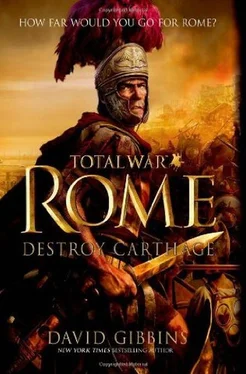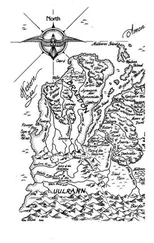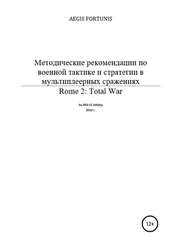David Gibbins - Total War Rome - Destroy Carthage
Здесь есть возможность читать онлайн «David Gibbins - Total War Rome - Destroy Carthage» весь текст электронной книги совершенно бесплатно (целиком полную версию без сокращений). В некоторых случаях можно слушать аудио, скачать через торрент в формате fb2 и присутствует краткое содержание. Год выпуска: 0101, Издательство: Thomas Dunne Books, Жанр: Исторические приключения, на английском языке. Описание произведения, (предисловие) а так же отзывы посетителей доступны на портале библиотеки ЛибКат.
- Название:Total War Rome: Destroy Carthage
- Автор:
- Издательство:Thomas Dunne Books
- Жанр:
- Год:0101
- ISBN:нет данных
- Рейтинг книги:5 / 5. Голосов: 1
-
Избранное:Добавить в избранное
- Отзывы:
-
Ваша оценка:
- 100
- 1
- 2
- 3
- 4
- 5
Total War Rome: Destroy Carthage: краткое содержание, описание и аннотация
Предлагаем к чтению аннотацию, описание, краткое содержание или предисловие (зависит от того, что написал сам автор книги «Total War Rome: Destroy Carthage»). Если вы не нашли необходимую информацию о книге — напишите в комментариях, мы постараемся отыскать её.
Total War Rome: Destroy Carthage — читать онлайн бесплатно полную книгу (весь текст) целиком
Ниже представлен текст книги, разбитый по страницам. Система сохранения места последней прочитанной страницы, позволяет с удобством читать онлайн бесплатно книгу «Total War Rome: Destroy Carthage», без необходимости каждый раз заново искать на чём Вы остановились. Поставьте закладку, и сможете в любой момент перейти на страницу, на которой закончили чтение.
Интервал:
Закладка:
But to go against these obligations, to pursue his feelings for Julia, would be to betray the memory of Scipio Africanus and the trust of his own birth father, to risk being outcast and losing everything. Once, when he and Fabius had been lying side by side at night on the slopes of the Circus Maximus, staring at the stars and sharing a flagon of wine, Scipio had confided his feelings for Julia to him, had shown him the amulet and had talked of his frustration. He had told him how he imagined a time when as a victorious general he would throw off the shackles of Rome and take her with him, but they both knew that in the cold light of morning it could be little more than a dream; even if it came about it could only be many years ahead when Scipio would be a battle-hardened soldier and his love for her might be a distant memory. Fabius knew only too well what was at stake for Scipio, how the career he was watching unfold would be driven by knowledge of the sacrifice he was making to honour his father and the elder Scipio, and to satisfy his own burning ambition to lead the greatest army Rome had ever seen back to Carthage to finish a conflict that could still threaten to destroy their world.
Fabius had stopped earlier that morning in the Forum and looked at the consular fasti, the list of the names of past consuls who represented all of the great patrician gentes of Rome, the forefathers of the boys in the academy. He remembered the first time he had overheard the Greek professors in the academy lecture the boys about morality: they must have courage, and they must have fides, be true to their word, and be temperate in their personal lives. He had smiled to himself when he heard that; he had seen what the boys got up to at night in the taverns and the brothels around the Forum. But that was before he had met Scipio. He was able to fight and brawl like any of them, and relish it; Fabius knew that only too well from his first encounter with him years before in the back alleys by the Tiber. But Scipio did not indulge in the vices like the other boys. It was as if something were restraining him, holding him back. Fabius knew from studying the fastes that Scipio was the noblest of them all, a boy whose birth gens was elevated enough but whose stakes were stacked even higher by being adopted into the family of Scipio Africanus, a name that still sent tremors through Rome more than thirty years after his victory in the war against Hannibal. Fabius had wondered whether history weighed too heavily on the younger Scipio, and whether he took that burden too seriously. A boy who could only excel in his own eyes if he equalled the achievements of his father and his adoptive grandfather, both of them illustrious generals, could not afford to indulge his base desires in the taverns and whorehouses of the city, if one day he might need to exert his moral authority to lead Rome to victory.
But Fabius knew there was more to it than that. Scipio was shy and could seem aloof; that had already earned him the scorn of those without the imagination to see the strength within but with the power to humiliate and torment him while he still had the vulnerabilities of adolescence. Scipio was Roman to the core, a true exemplar of Roman morality rather than one who simply paid lip service to it as so many of the others did, but he had also benefited from the intellectual rigour of a Greek education and could see where Rome had become self-absorbed, where the lives that aristocrats were expected to lead no longer had the hard edge of the old ways. He hated the oratory and sophistry that they were expected to learn in the law courts, the skills that would see the sons of patricians climb steadily through the cursus honorum, the step-by-step sequence of magistracies that were essential to rise to the highest office, to the consulship. Above all, he hated the fact that the cursus honorum was also the route to army command, rather than military experience itself. Scipio had to endure the critical eye of those who questioned the ability of a young man to rise to high office and honour his gens — a young man who, instead of being in the law courts, spent his days studying military strategy and learning swordplay, and his leisure time hunting in the mountains as far away from Rome as he could get.
But Fabius had overheard Scipio’s father Aemilius Paullus talk to his mother about him one day in their house, about how Scipio was living up to the hopes that Africanus had expressed for his successors, for the next generation of Roman war leaders. He had said that morality was the key, a personal code of honour. Aemilius Paullus had known that his son would suffer for it, but that his sensitivity to the criticism of others would be the seedbed of his strength. Scipio already had a reputation for keeping his word, for fides, and his abstinence from debauchery was also a good sign. It was then that Fabius had made it his own mission to watch out for Scipio, not only protecting him physically but also keeping him from being ruined by his own sensitivities, and from developing a resentment of Rome that would be self-destructive. Seeing him here at the head of the boys in the academy was an important step in the right direction, although there were many challenges ahead.
He glanced at the sand-timer on the table, seeing that the twenty minutes of study were nearly up and the boys were becoming restless. Ennius had been working on something in the corner that Fabius hoped would keep them preoccupied until Petraeus arrived. What happened then would depend on the old centurion’s temperament that day, on whether the baths had soothed the fire that raged within. Fabius had smiled wryly to himself when he had seen the newest arrival in the academy, Scipio’s cousin Gaius Paullus, go white at the mention of the centurion’s imminent arrival, his fearsome reputation having preceded him. Whether or not Petraeus was in an indulgent mood, there could be no doubt that the next big challenge confronting the boys was not some distant enemy on a Macedonian battlefield but the very embodiment of all that was strong about Rome herself. The old centurion Petraeus was about to bear down on them and mete out wisdom and toughness that one day might make some of them the equal of such a man on the battlefield.
2
‘Scipio! It’s ready!’ The voice came from the corner of the room opposite Hippolyta, from a wide recess containing a fireplace. Fabius could just make out a figure in the gloom squatting over the brazier, a lighted tallow candle in one hand. He saw Scipio glance anxiously at the door where the centurion would arrive, and then look at the others. ‘All right. Ennius has something to show us. But at the first sound of the centurion coming down the corridor, everyone rushes back to their places around the table. You know what old Petraeus thinks of Ennius’ inventions. We’ll all be for it.’
They crowded around the recess, Hippolyta included. Polybius stood alongside Scipio, his hands behind his back, peering with interest over the others, looking much more a scholar than a soldier. Ennius’ experiments of the last few months owed much to Polybius, who had introduced him to the wonders of Greek science and fuelled his fascination with military engineering. Scipio nudged Polybius. ‘So what ancient magic have you revealed to him this time, my friend?’
Polybius shrugged. ‘We talked yesterday about Thucydides’ account of the siege of Delium.’
Gulussa was standing beside them, and looked keenly at Polybius. ‘In the year of the three hundred and fiftieth Olympiad, that is, a hundred and fifty-six years ago,’ he said, his Latin accented with the soft guttural sound of Numidian. ‘The action where the philosopher Socrates fought as a hoplite, when the Athenians were routed by the Boeotians. The first major battle in history to involve full-scale tactical planning, including the detailed coordination of cavalry and infantry.’
Читать дальшеИнтервал:
Закладка:
Похожие книги на «Total War Rome: Destroy Carthage»
Представляем Вашему вниманию похожие книги на «Total War Rome: Destroy Carthage» списком для выбора. Мы отобрали схожую по названию и смыслу литературу в надежде предоставить читателям больше вариантов отыскать новые, интересные, ещё непрочитанные произведения.
Обсуждение, отзывы о книге «Total War Rome: Destroy Carthage» и просто собственные мнения читателей. Оставьте ваши комментарии, напишите, что Вы думаете о произведении, его смысле или главных героях. Укажите что конкретно понравилось, а что нет, и почему Вы так считаете.












